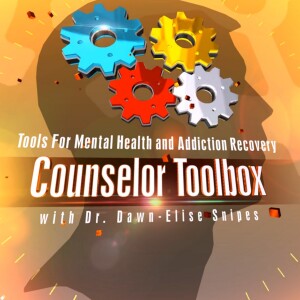
Counselor Toolbox Podcast with DocSnipes
Health & Fitness:Mental Health

1003-Developing Respect to Save Your Marriage _ Pastoral Counseling
 2024-09-10
2024-09-10
Video Title: Managing Depression: Tips and Strategies
Presenter: Dr. Dawn-Elise Snipes
1. Introduction to Depression- Definition and Understanding of Depression:
- Depression as a mental health disorder characterized by persistent sadness, loss of interest, and other symptoms that affect daily functioning.
- Emphasis on the importance of understanding depression as a complex condition influenced by multiple factors, including biological, psychological, and social elements.
- Common Symptoms of Depression:
- Persistent sad or empty mood, feelings of hopelessness, irritability.
- Loss of interest in activities, changes in appetite or weight, difficulty sleeping.
- Fatigue, feelings of worthlessness or guilt, difficulty concentrating, thoughts of death or suicide.
- Criteria for Diagnosis:
- Overview of how depression is diagnosed based on symptom duration and impact on daily life.
- Importance of professional evaluation in diagnosing depression.
- Biological Factors:
- Discussion on genetics and brain chemistry as contributing factors to depression.
- Psychological Factors:
- Role of personality, coping skills, and previous trauma or stress.
- Social and Environmental Factors:
- Impact of life events, social support, and socioeconomic status.
- Psychotherapy:
- Cognitive-behavioral therapy (CBT) as an effective treatment.
- Other therapeutic approaches including interpersonal therapy (IPT) and dialectical behavior therapy (DBT).
- Medications:
- Overview of antidepressants, how they work, and their role in treatment.
- Lifestyle Changes:
- Importance of exercise, nutrition, and sleep in managing symptoms.
- Alternative and Complementary Therapies:
- Mention of mindfulness, yoga, and other holistic approaches.
- Coping Mechanisms:
- Techniques such as journaling, mindfulness, and relaxation exercises.
- Building a Support System:
- Encouragement to reach out to friends, family, or support groups.
- Routine and Structure:
- Establishing a daily routine to provide stability and predictability.
- Addressing Stigma:
- Discussion on the stigma surrounding mental health and the importance of seeking help.
- Overcoming Barriers to Treatment:
- Common obstacles such as fear of judgment, lack of access to care, and strategies to overcome them.
- Encouragement and Hope:
- Reinforcement that depression is treatable, and recovery is possible with the right strategies and support.
- Call to Action:
- Encouragement to seek professional help if needed and to implement the discussed strategies in daily life.
Chapters:
00:00:00 - Developing Respect
00:06:02 - Valuable qualities and respect inventory
00:11:49 - The Importance of Respect in Relationships
00:18:02 - Communicating Expectations
00:24:11 - Addressing Disrespect in Relationships
00:30:16 - Respecting Personal and Partner's Boundaries
00:36:21 - Respecting Boundaries in Relationships
00:42:12 - Communication and Respecting Boundaries
00:48:11 - Unequally Yoked with Unbelievers?
00:54:05 - Examining Facts and Beliefs in Relationships
Learn more about your ad choices. Visit megaphone.fm/adchoices
More Episodes
 2024-10-29
2024-10-29
Create your
podcast in
minutes
- Full-featured podcast site
- Unlimited storage and bandwidth
- Comprehensive podcast stats
- Distribute to Apple Podcasts, Spotify, and more
- Make money with your podcast
It is Free
- Privacy Policy
- Cookie Policy
- Terms of Use
- Consent Preferences
- Copyright © 2015-2024 Podbean.com


